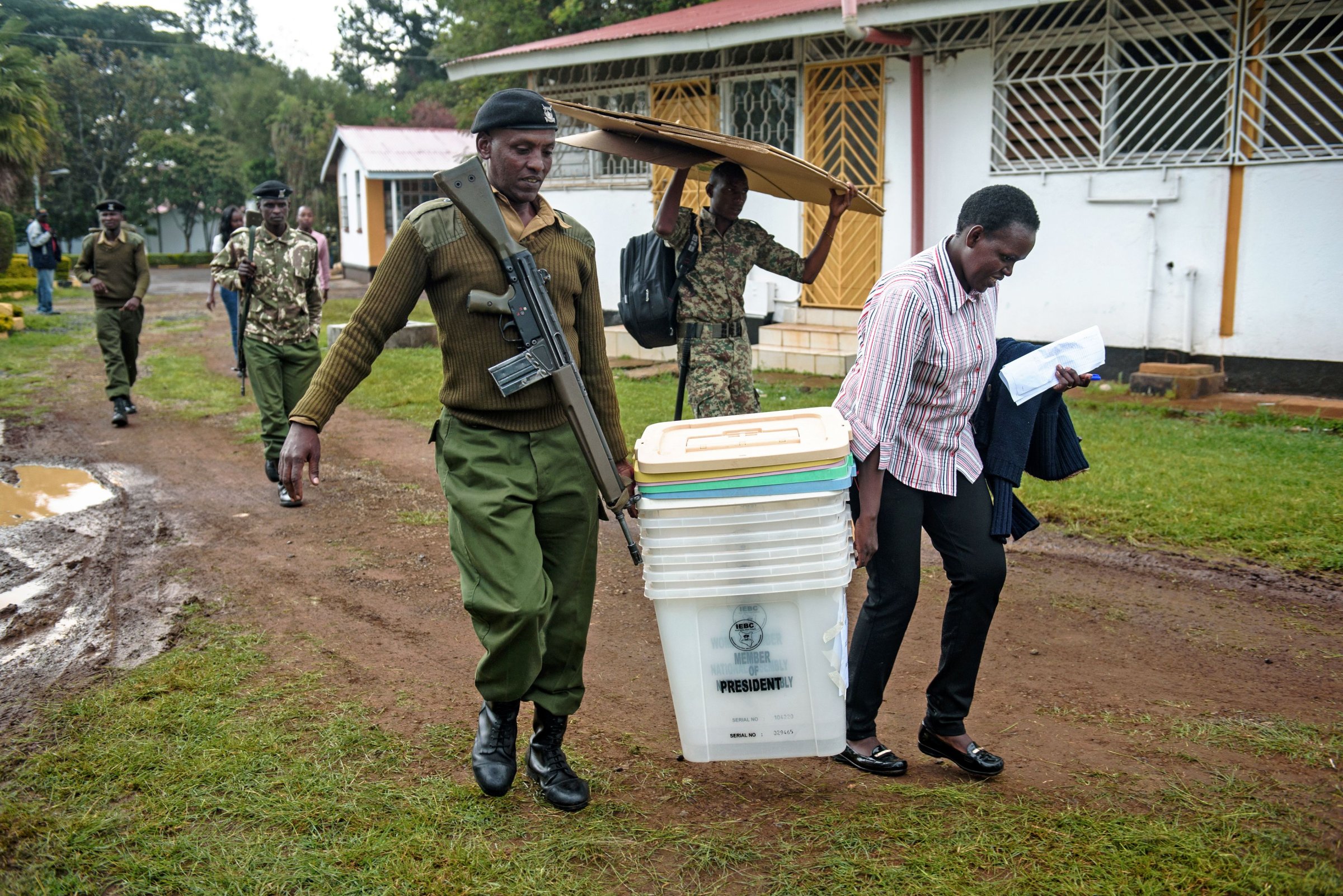
(NAIROBI) – Kenyans queued in large numbers through fields and along pavements early on Tuesday to vote in the latest electoral showdown between the country’s main political dynasties.
Shrouded in fears of violence, the close-fought clash pits President Uhuru Kenyatta, 55, the businessman son of Kenya’s founding president, against Raila Odinga, a 72-year-old former political prisoner and son of Kenya’s first vice-president.
The arch rivals are facing each other for the second time, and opinion polls have put them neck-and-neck after two months of campaigning marked by fiery rhetoric but public speeches largely free of the ethnic hate that has sullied previous contests.
The winner needs one vote more than 50 percent.
First results are not expected before Wednesday, but a very close race might mean as long as three days before a winner emerges. Officially, election authorities have up to a week to declare the outcome.
Police fired tear gas outside one Nairobi polling station to quell an impatient crowd, a Reuters witness said, although elsewhere early voting appeared to go off without a hitch.
At the Mutomo primary school outside Nairobi, where Kenyatta is due to vote, hundreds of people had waited in line since 2 am, wrapped in jackets and blankets to protect themselves against the cold and drizzle.
As in the last national election in 2013, Lydia Gathoni – 102 years old and a Kenyatta stalwart – was first in line to cast her ballot. Before entering the polling booth, she led a short prayer for peace and for her political idol.
“Let God share with him the wisdom of Solomon,” she intoned, clutching a rosary in one hand and her voter card wrapped in a grimy handkerchief in the other. “Let God prevail. Let God govern the country,”
The razor-thin margins forecast have increased the chances of glitches – innocent or otherwise – giving grounds for the loser to complain about the result, as Odinga did in 2007 and in 2013.
A decade ago, vote tallying was abruptly stopped and the incumbent president declared the winner, triggering an outcry from Odinga’s camp followed by outbreaks of ethnic violence in which 1,200 people were killed and 600,000 displaced.
International Criminal Court cases against Kenyatta and his now-deputy, William Ruto, collapsed for lack of evidence.
In 2013, electronic voting equipment suffered widespread failures, although Odinga’s decision to limit his complaints to the courts prevented any unrest.
There were no reports of early technical problems on Tuesday.
This time – probably Odinga’s last tilt at the top job in East Africa’s biggest economy – the opposition has repeatedly accused the government of trying to rig the polls.
At two polling stations in Kisumu, an Odinga stronghold in western Kenya swept up in the 2007 unrest, a few complained about their names not being in the electronic voter register, a high-tech system introduced this year to combat fraud.
“What am I supposed to do?” said Catherine Okello, frustrated by a hotline text message telling her to go to the nearest election commission office to sort out the problem. “Everyone from the commission is at the polling station.”
Ethnic Strongholds
The torture and murder last week of a top election official and the deportation of two foreign Odinga advisers have fuelled wild online conspiracy theories and “fake news” items consumed voraciously by Kenya’s tech-savvy population.
Tens of thousands have returned to their ethnic strongholds ahead of the elections, fearful of a repeat of the 2007 violence.
In New York, UN Secretary General Antonio Guterres called for a commitment from all parties to “credible and peaceful elections”, his spokesman said.
Odinga’s key support is in the west and along the coast, with Kenyatta’s strongholds in central Kenya and the Rift Valley. Urban centres are up for grabs.
“Everyone is coming out early and in big numbers because we need change so badly,” said Anne-Marie Omondi, a 28-year-old Odinga supporter in Kisumu.
The government has deployed more than 150,000 security personnel, including wildlife rangers, to protect 41,000 polling stations.
The electoral commission insists it has run all necessary tests to safeguard the tallying and transmission of results, although a partial test laid on last week for the media hit some snags.
There are more than 6,000 domestic observers, and party agents at each tallying station will have to sign off on results that are then sent electronically to county offices and a national collation centre in the capital, Nairobi.
In addition to a new president, Kenyans are electing lawmakers and local representatives, the result of a post-2007 constitutional shake-up designed to devolve power and reduce the “winner takes all” nature of the presidential race.
More Must-Reads from TIME
- Cybersecurity Experts Are Sounding the Alarm on DOGE
- Meet the 2025 Women of the Year
- The Harsh Truth About Disability Inclusion
- Why Do More Young Adults Have Cancer?
- Colman Domingo Leads With Radical Love
- How to Get Better at Doing Things Alone
- Michelle Zauner Stares Down the Darkness
Contact us at letters@time.com